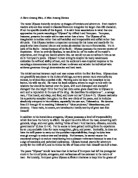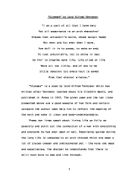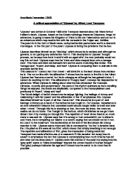The initial contrast between myth and man comes within the first few lines. Ulysses does not gracefully acquiesce to the duties of old age, as every person must eventually do; instead, he whines like a spoiled child. Nothing suits his taste: his homeland is too barren, his wife too old. He treats his loyal subjects, whom he ought to rule with the wisdom that should be learned over the years, with such disrespect and shameful disregard that one might think that they had done some grave disservice to Ulysses to earn such a reputation in the eyes of the king. He describes his subjects as “…a savage race, / That hoard, and sleep, and feed, and know not me” (Lines 4-5). Ulysses maintains his superiority complex throughout the first two-thirds of the poem, and he includes absolutely everyone in his criticism, especially his own son, Telemachus. He devotes lines 33 through 43 to mocking Telemachus’ “slow prudence,” blamelessness, and decency. These traits, he sneers, are harmless but hardly worthy of great men like himself.
In addition to his incredulous arrogance, Ulysses possesses a level of irresponsibility which few have the luxury to afford. He spent his entire life on the road, consorting with generals, kings, and even gods, visiting “cities of men / And manners, climates, councils, governments” (Lines 13-14). Yet he seems to have gained nothing from the experience by an unquenchable thirst for more recognition, glory, and power. Ironically, he does not have the will-power to carry out his quotidian responsibilities; though he does have enough strength to endure war and hardship. Furthermore, he cannot muster the emotional strength to endure transitioning into a pleasant retirement because he sees it as a sign of weakness and pathetical uselessness. Ulysses instead yearns for adventure purely for the thrill of it, and he thinks the life of those other than himself too dull to bear.
The poem “Ulysses” would have been lost in bathos if Tennyson had left his protagonist stuck in the ruts of pride, arrogance, and restlessness all too common to the nature of man. Fortunately, Tennyson gives Ulysses sufficient charisma to keep him the graces of the reader. He speaks with such confidence and eloquence while describing his past exploits that the reader is almost as convinced of his superiority as he, himself. He casts the consistent abandonment of his family and kingdom in the romantic light of wanderlust that only the most cynical would dare challenge. More significant is Ulysses’ own lack of cynicism. He may be old and unhappy in his present situation, but the unshakable, sincere childlike faith he has in his own fantasies prevents his men and even the reader from questioning the validity of his ideas.
Another of Ulysses’ redemptive qualities is his courage. Although he was a fabled soldier in the Trojan War, he exhibits more courage at the time these lines are spoken. The fight he wages this time will not win him medals or fame, nor will it leave him with an adrenaline high after a successful charge. It is, in fact, a fight he cannot win. It is a fight, quite literally, to the death. It is a fight with Death, itself. He rarely alludes to his old age, and the obvious frustration he feels at being forced “to pause, to make an end, / To rust unburnish’d, not to shine in use! / As tho’ to breathe were life!” (Lines 22-24) hints at his fear of facing old age and death. Nevertheless, Ulysses rises to the occasion. The inevitable will certainly come, perhaps even soon, but Ulysses refuses to give Death and old age any power over the way he lives his life.
The last third of this powerful monologue serves as a call to arms to his mariners as well as to the reader. He directs the last stanza to his mariners, “Souls that have toil’d, and wrought, and thought with me” (Line 46). This descrition just as easity applies to the reader, who at this point can identify with Ulysses’ imperfections, virtues, and fears. Ulysses draws us in with his charismatic address; each succeeding line swells like the sea, building to a crescendo, until it breaks over the the reader in line 56:
“…Come, my friends.
‘Tis not too late to seek a newer world.
Push off, and sitting well in order smite
The sounding furrows; for my purpose holds
To sail beyond the sunset, and the baths
Of all the western stars, until I die.”
This open invitation to join Ulysses in his last heroic voyage seals the bond between the reader and the speaker, Ulysses. These lines encourage the reader, supplying the courage to fight the battles each individual must face. The reader leaves, inspired, strengthened, and unapologetic:
“We are not now that strength which in old days
Moved earth and heaven, that which we are, we are-
One equal temper of heroic hearts,
Made weak by time and fate, but strong in will
To strive, to seek, to find, and not to yield.” (Lines 66-70)







